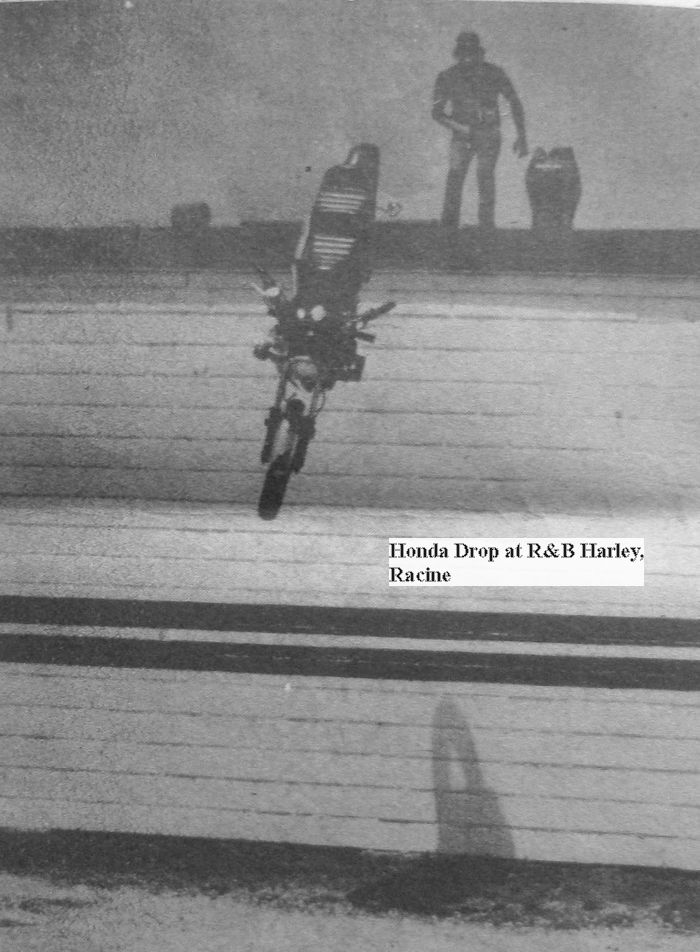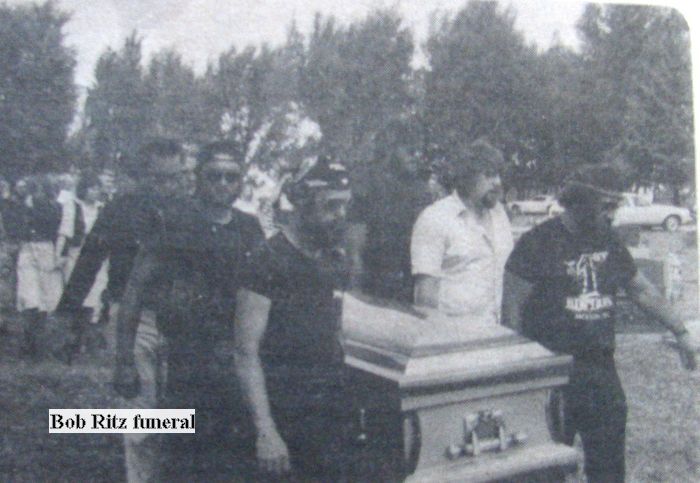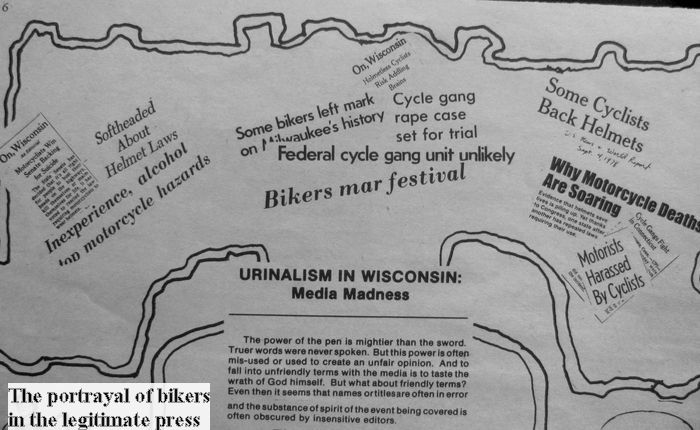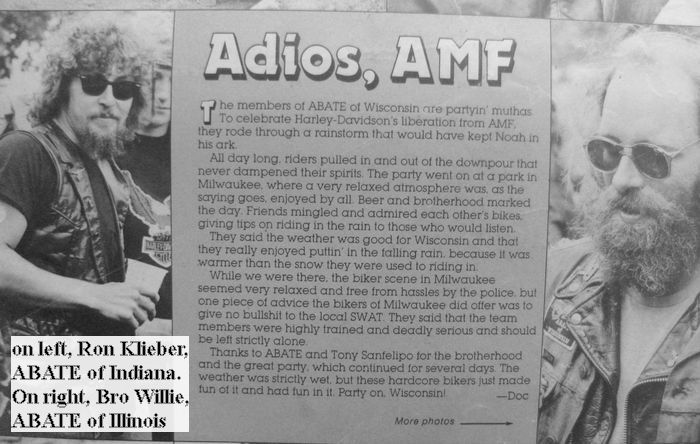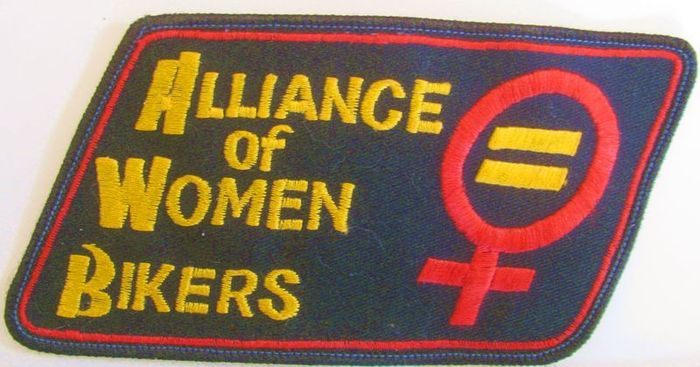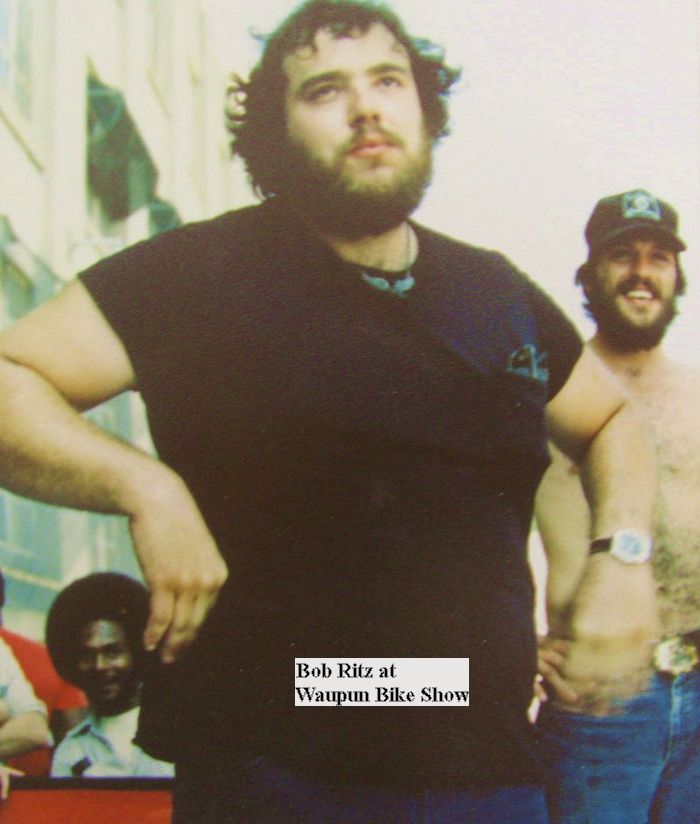By 1980, we were sure that we weren’t going to be able to relax after our helmet repeal. Things were just starting to get really busy. We were mad that neither the MDA nor Harley-Davidson had supported us during and after the Ride to Road America fiasco. Barton Neri, District representative for the MDA, expressed pleasure that HD was joining ABATE in promoting the ride. After the utter failure, thanks to the many negative articles in the newspapers about bikers, there was complete silence from both.
Some of the negative press can be attributed to our own failure to get along as a motorcycle community. These were turbulent times, and the previous December, a member of the Heaven’s Devils MC was shot and killed in a bar in Milwaukee. A Milwaukee Sentinel reporter was also seriously wounded at the bar. That resulted in a whirlwind of negative articles about the club thought to be responsible at the time. Then, in March, a member of the CC Riders MC was killed by a member of yet another club. These acts, and other less serious incidents, prompted a barrage of attacks on the motorcycle club lifestyle. Just a short time later, when Wisconsin tried to pass RICO-style legislation, ABATE business agent Tony “Pan” Sanfelipo testified at a hearing that the events surrounding the shootings prompted the legislation being put on a fast-tract for passage. More on this below.
ABATE had other irons in the fire at this time. Due to growth, two new region delegates were appointed to represent the heavy concentration of memberships that Milwaukee representative Denny Dortz was handling. Keith “Shark” Hanson was to represent members in Walworth, Racine and Kenosha counties. Members in Manitowoc and Sheboygan counties were represented by Mike Hecker. There were now seven regions in Wisconsin, based in Fond du Lac, Milwaukee, La Crosse, Green Bay, Eau Claire, Sheboygan and Racine. Mark “Leggs” Birshbach was the current president of ABATE. The designation of the leader of ABATE evolved from Co-Directors to President, Director, and finally Executive Director over the years.
In 1979, our monies in the MORP fund were almost stolen and placed into the DOT general ledger, after Governor Dreyfus saw no movement in the program. Thanks to Richard Smith of the WBBA, he was convinced to give the program a little more time to develop. Then, the Rapid Angels MC and the AMA were able to convince local government in Adams County to use $90,000 of the MORP funds to acquire and develop a 174-acre facility just south of Wisconsin Rapids. The town of Dyracuse Mound would buy 154 acres and lease an additional 20 acres from the Rapid Angels. It was hoped that the development of this park would encourage other communities to pursue development. Rock County was conducting a feasibility study at this time, costing $16,000. About $12,000 of that cost came from the MORP fund. Meanwhile, Governor Dreyfus wrote that the final award levels of the program would be reviewed to determine if the program was useful to the state.
Another phenomenon was taking place around this time; the so-called Honda Drop craze. Some of our membership thought this activity to be irresponsible or mean-spirited. In later years, subsequent administrations of ABATE were even less kind about the practice. It’s important to understand the history of the time, and the mind-set of the bikers in the early 1980s.
First of all, the events weren’t directed at any specific brand, although Honda seemed to take the brunt of the carnage. The drops were a protest over the glut of Japanese imports of motorcycles that were threatening the existence of Harley-Davidson. It took President Ronald Reagan to curtail the import of Japanese motorcycles to help HD recover. The factory was also in the middle of a buy-out by a small group of executives, hoping to rescue the company from AMF and put reliability back in the motors. AMF refused to spend much of anything on research and development, and the production and sales of bikes suffered. It wasn’t only motorcycles that were in danger. In January, 1981, Japan recorded a record 531,539 cars exported to the U.S. just in that month. At the same time, Chrysler, Ford, General Motors, and American Motors all posted losses; 1.7 billion, 1.5 billion, 763 million, and 197.5 million dollars.
Our steel production had fallen below that of Japan’s, and they also dominated our markets in televisions, cameras, calculators, stereo components and more. So it wasn’t hard to accept the Japanese import protests as an exercise of American free speech, and in the biker world, free speech on steroids. It was Honda’s they were smashing; it was the threat to American industry by the Japanese that was the target. Honda, and other models were just the symbol. Some of the best “drop-protests” took place at R&B Harley-Davidson in Racine, and behind Bubba’s Bar on Villard Ave. in Milwaukee, later to move to Great Lakes Dragaway. Willie G. Davidson and a few executives at Harley-Davidson actually rode down to R&B to enjoy the festivities, but that practice came to an end when some vice president in marketing or public relations thought that was a bad idea. In a news article just prior to the Honda Drop at Great Lakes Dragaway, Bubba Troutman explained, “The Honda Drop is not meant, nor is it intended, to degrade Japanese products or the people who own them.”
Another threat the bikers of Wisconsin faced was the push to adopt a RICO bill. As usual, a proposed bill is supposed to have a public hearing. All hearings for the following week are supposed to be posted in the Sunday edition of the State Journal, with a deadline for submission on the previous Friday. The less opposition to a bill, the more likely it is to pass out of committee with a favorable recommendation. As it happens, for whatever reason, notice of the upcoming public hearing on the RICO bill failed to make the Friday deadline for the State Journal. Of course, we were sure it was done on purpose. We would never have known about this, and the bill probably would have flown through committee. Thanks to our recently acquired group to the ABATE family, the Alliance of Women Bikers, business agent Tony Pan received a phone call from Sue Menard, president and founder of the Alliance. It turns out one of her members worked for a district attorney, or some other law enforcement agency, and got wind of the hearing scheduled for the following week. ABATE immediately got a phone tree organized, and by the end of business Monday, state representatives received over 300 calls in opposition to passage of the bill. At this time, it only had a legislative reference bureau number.
To top things off, ABATE appeared at the hearing in person to testify in opposition. Richard Smith of the WBBA had also met with Attorney General Bronson La Follette to discuss the shortcomings of the bill. He registered in opposition of the bill at the hearing. ABATE president Mark “Leggs” Birschbach and business agent Tony “Pan” Sanfelipo testified against the bill in the packed hearing room. Crowding in the back of the room was law enforcement and members of various district attorney’s offices. They were absolutely surprised that we were able to convene a phone tree and show up in person to testify against what they thought would be a “slam dunk” of a proposal nobody was supposed to know anything about.
The chief sponsor of the bill was Attorney General Bronson La Follette, and he addressed the Assembly Criminal Justice and Public Safety Committee. According to La Follette, the bill, authored by Representative James Rutkowski, was aimed at organized crime and would prohibit the use of proceeds gained from racketeering from being invested in business or property. Racketeering was described as crimes in financial institutions, securities, liquor, controlled substances, life and bodily security, property, prostitution, gambling and government administration.
Based on what we saw happening out west to clubs like the Hells Angels, we believed agencies, like the Milwaukee Police Department, would use RICO to harass anybody with long hair and motorcycle attire. When Rep. Rutkowski assured us that the bill would not be used against anybody not in organized crime, Leggs reminded him that police chief Harold Breier boldly stated that there was no organized crime in Milwaukee, so why the need for the bill. Sanfelipo further testified that he thought the bill might have been drafted to take advantage of a slew of negative articles aimed at motorcycle violence recently. “Although unfortunate,” Sanfelipo testified, “club rivalry or hatred is not racketeering.”
The bill created the new category of crime of engaging in a continuing criminal enterprise, and penalties could be imprisonment of 10 years to life and fines of up to $200,000. In ending his testimony, Sanfelipo complained that the wording of the proposed legislation was vague and overly broad, and could be applied to almost any kind of criminal activity. The committee agreed and La Follette was told to redraft the bill with less vague language and present it for consideration at a later date. Another victory for ABATE and WBBA, although it would be short-lived and a new version of the bill would be submitted later and eventually pass.
In April, 1981, Senators Adelman and Engeleiter co-sponsored a bill to allow a motorcycle to be equipped with a modulating headlamp, modulating at a rate of 200-280 changes per minute. There was also consideration at the time for a flashing brake light system. The new law went into effect on November 11, 1981. David Bohlman, chairman of the motorcycle safety advisory council, said the pulsing headlamp made motorcycles more conspicuous, stating they could be used only during daylight hours. The new law also permitted a device to warn other motorists when the cycle was decelerating by use of a pulsing amber light mounted on the rear of the cycle. The use of these lights was permissive, not mandatory.
1980-’81 were also sad years for ABATE of Wisconsin. Popular ABATE member Bob Ritz, owner of Zelof’s Bar in Hartford, died on July 1, 1980, as a result of a motorcycle crash. He was a great friend to ABATE, and especially liked by his brothers and sisters in the Hartford region. He was also the winner of the infamous hotdog eating contests at Waupun during the prison bike show. There was a gentle calm about him and he was always smiling.
May 27, 1981, we lost another member of our ABATE family. Bob Hinze, the leader of the popular “Zipper Band,” left us shattered after his passing. A member of the Fond du Lac chapter of ABATE, Bob was also a member of the Ozaukee Guzzlers MC. His band entertained at many ABATE functions, and was a favorite at the Waupun prison show. He and Bob Ritz were huge losses and many of us still mourn their passing today.


